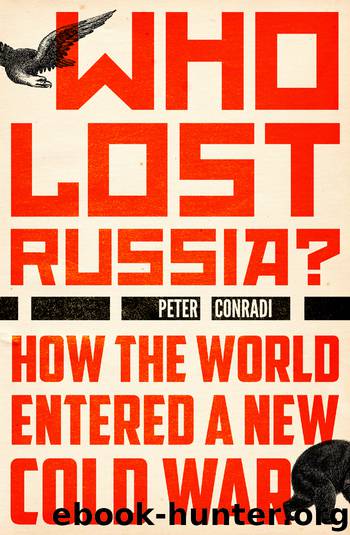Who Lost Russia? by Peter Conradi

Author:Peter Conradi
Language: eng
Format: epub, mobi
Publisher: Oneworld Publications
AT THE TIME OF PUTIN’S MUNICH SPEECH, he had just over a year to serve of his second and – under the terms of the Russian constitution – final term. Yet Putin was not yet ready to give up power, and he was not going to allow constitutional niceties to stand in his way. A solution had to be found: the simplest would be to engineer a change in the constitution to allow for a third or fourth term, a tactic followed by the leaders of Kazakhstan and Uzbekistan, whose presidents were still in power after almost two decades. However, this would hand further ammunition to his critics.
As the date of the presidential election, set for 2 March 2008, approached, other more inventive solutions presented themselves. Talks scheduled for December between Russia and Belarus to discuss a long-term merger of their countries prompted speculation that Putin might become president of what, in strict constitutional terms, would be a new nation, thereby resetting the electoral clock. Yet the talks proved fruitless – and even before they had started, Kremlin sources had dismissed the idea as mere speculation.
Putin had another solution: in October, during the conference of the United Russia Party, he announced that he might become prime minister the following year. Putin had often said he intended to remain involved in politics after his second term expired and that he might seek re-election after someone else took his place as president. With this statement, however, he made it clear that there would be no break in his influence. Implicit in this was a reinterpretation of the Russian constitution to turn the prime minister into a powerful figure in his own right, rather than merely a tool of the president, as had hitherto been the case.
But who would take Putin’s place in the Kremlin? For much of the year, speculation centred on three men: Dmitry Medvedev, the first deputy prime minister and chairman of Gazprom; Sergei Ivanov, a deputy prime minister and defence minister; and Vladimir Yakunin, head of the Russian railways. All were members of Putin’s St Petersburg circle. There was also some speculation about Viktor Zubkov, who was appointed prime minister that September. Another Putin associate from St Petersburg, he had been involved in the fight against money laundering and financial crime, initially in that city and then in Moscow. Soon after taking the job, Zubkov spoke publicly of the possibility of standing for president.
It was not to be: on 10 December 2007, Putin appeared on television alongside the leaders of the four political parties allied with the Kremlin to announce that he was formally endorsing Medvedev. ‘I’ve been very close to him for more than seventeen years,’ Putin declared. ‘I fully and completely support this candidate.’
Medvedev, with his background in the law rather than in the state security services, had virtually no independent power base in the Kremlin. Nor had he ever stood for popular election. Yet this weakness was, in a sense, his strength, as far as his suitability to Putin was concerned.
Download
This site does not store any files on its server. We only index and link to content provided by other sites. Please contact the content providers to delete copyright contents if any and email us, we'll remove relevant links or contents immediately.
| Anthropology | Archaeology |
| Philosophy | Politics & Government |
| Social Sciences | Sociology |
| Women's Studies |
The Secret History by Donna Tartt(19011)
The Social Justice Warrior Handbook by Lisa De Pasquale(12179)
Thirteen Reasons Why by Jay Asher(8878)
This Is How You Lose Her by Junot Diaz(6866)
Weapons of Math Destruction by Cathy O'Neil(6253)
Zero to One by Peter Thiel(5776)
Beartown by Fredrik Backman(5722)
The Myth of the Strong Leader by Archie Brown(5487)
The Fire Next Time by James Baldwin(5418)
How Democracies Die by Steven Levitsky & Daniel Ziblatt(5207)
Promise Me, Dad by Joe Biden(5137)
Stone's Rules by Roger Stone(5070)
A Higher Loyalty: Truth, Lies, and Leadership by James Comey(4942)
100 Deadly Skills by Clint Emerson(4906)
Rise and Kill First by Ronen Bergman(4766)
Secrecy World by Jake Bernstein(4733)
The David Icke Guide to the Global Conspiracy (and how to end it) by David Icke(4693)
The Farm by Tom Rob Smith(4496)
The Doomsday Machine by Daniel Ellsberg(4477)
